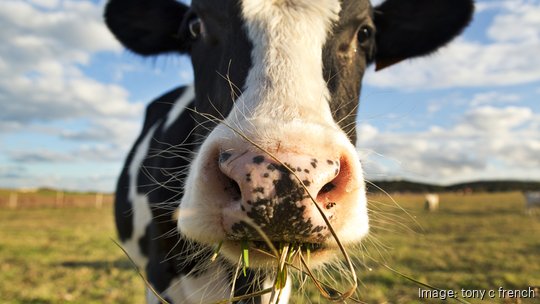
As the world works to offset carbon emissions, a pair of Raleigh entrepreneurs are exploring an unconventional way to tackle the problem: reducing cow emissions.
Studies have shown that methane from cattle accounts for a significant share of global greenhouse gas emissions, and Raleigh-based Hoofprint Biome could have an answer in a new probiotic blend, one that the company's founders say could help both the environment and farmers.
Investors are buying in. The company recently closed on nearly $2.3 million of a planned $4.3 million round.
Hoofprint President Kathryn Polkoff, who cofounded the company with fellow North Carolina State University doctoral alum Scott Collins, said the money will go toward testing the efficacy of the probiotics.
The technology the four-person team is developing would be targeted at farmers, a probiotic that they could feed to their cows, boosting their digestive health. The theory is that the boost would also help reduce the methane emissions – or gas – the cows release.
Ambitions are high, Polkoff said.
“We’re striving for global impact. … I think the goal here is to really reduce the amount of methane and increase the amount of value that the shareholders have – the shareholders being the farmers themselves,” she said.
Polkoff, whose background is in animal science, met Collins, whose background is in biomolecular engineering, at N.C. State. The problem seemed huge. Polkoff initially learned about cow methane as a production efficiency problem – not an environmental pollutant. Methane costs cows up to 12 percent of their feed energy, she said.
But in a world where attention on climate change is increasing, the opportunity seemed huge.
“We saw a pretty good opportunity,” she said.
So the pair founded a company, initially casting a wide net in terms of potential locations.
Polkoff, an Illinois native, spoke with investors from places with a reputation for entrepreneurship, such as the Bay Area and Boston. They all pitched their areas as the perfect place to launch an upstart in the biotech sector.
“We said, yeah, that’s really nice, but where are the cows? Where are the fields?” she said.
Raleigh became an easy pick – having the life sciences ecosystem and the proximity to farms that could someday be customers.
With the latest tranche of funding, the company will work to get comprehensive data that shows how the probiotic impacts both methane emissions and animal health, Polkoff said.
Hoofprint’s fundraising success joins other local startups in recent weeks – perhaps a sign that the tight funding environment is opening up. Other fundraises for Triangle firms documented in recent securities filings include HomeCloud, which raised $4.4 million; Trio Labs, which closed on $2.1 million; Restor3d, which raised $17 million; and Virtue Labs, at $8.4 million.